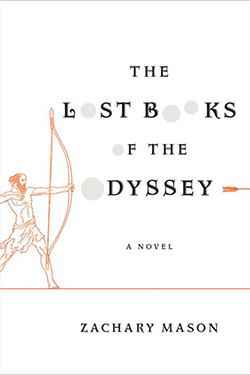The Lost Books of the Odyssey
by Zachary Mason
reviewed by Laura Albritton
The Lost Books of the Odyssey by first-time novelist Zachary Mason retells Odysseus’s voyage back to Ithaca from Troy, interwoven with flashbacks from the Trojan War. As the author points out in his preface, the Iliad and the Odyssey were born of an oral bardic tradition in which poets recounted competing versions of the same ancient events. Homer is remembered for having crafted these disparate stories into perhaps the world’s greatest epic poems. In an attempt to recreate the pre-Homeric experience, Mason imagines each of his forty-four chapters as an alternative version to the standard Homeric texts; each presents a different version or perspective, sometimes conflicting, of the famous tales. The delight in reading Mason’s book comes from first recognizing the mythic characters and scenes and then following his new, unpredictable account.
In Book 6, for example, entitled “Penelope’s Elegy,” Odysseus returns to Ithaca. He is initially angry, so one may reasonably presume that, as in the Odyssey, he has been warned that suitors have taken over his home and that his wife, Penelope, is using her famous ruse of weaving a funeral shroud for her father-in-law and unraveling it at night to put off the predatory men as long as possible. But instead of suitors, Odysseus finds relatives in his hall, who are all thrilled to see him. He spots his wife, but she behaves strangely. The truth dawns on him when they show him where Penelope was buried.
Odysseus attempts to ignore his wife’s ghost: “He mastered his desire to seize her legs and kiss her thighs and hands for he knew she would turn to ash and shadow as soon as he touched her and moreover nothing is more disgraceful than to acknowledge the presence of the dead.” The story confounds all our expectations of the battle with the suitors and the happy reunion with Penelope. It also makes the reader contemplate the experience of returning home from war, even today, and how domestic life can be altered and even devastated during an absence. Finally, this episode momentarily dulls the shine of Odysseus’s legend. In this chapter he does not get to play the hero but is depicted rather as a man wounded by a sudden, personal loss. If Odysseus had truly existed in history, and if he was truly away for twenty years, then it is certainly possible that his wife would have died, given average life expectancies in that era. The possibilities raised by “Penelope’s Elegy” act as a sort of meditation on Homer, the ancient world, and the uncertainties of life in general.
Although many of the chapters follow Odysseus’s movements, there are also those in which Odysseus is tangential or only distantly connected to the action. In “Cassandra’s Rule,” we see the Trojan King Priam’s daughter, Cassandra, acquiring the gift of prophecy from the god Apollo. For the most part, this version follows the Iliad, the Odyssey, and Aeschylus’s Agamemnon. As in the original works, Cassandra is granted the gift of prophecy, but Apollo tells her, “Never mind. No one will ever believe you.” She sees that Troy will lose the war and that the Greeks will sneak into the city by means of the Trojan Horse (a plot conceived by Odysseus), but no one pays any attention to her warnings. Mason writes, “She thought of fleeing but knew from the fall of the city wall’s shadow, from the voice of the wind sighing through the towers and from the shapes of the bright clouds overhead, always changing, that it would not be so, that her fate was elsewhere, that for once the god had lied.” Here is Mason’s crucial addition: Apollo had lied in the sense that Cassandra herself believed her own prophecies.
Mason portrays the claustrophobic sense of being trapped by fate, yet at the same time illustrates the singular rebellious intelligence of individual people. Cassandra, like Odysseus, has this capacity but, unlike the Ithacan king, she cannot escape tragedy. In Mason’s stories one is reminded of the intimate humanity of the characters, and at the same time forced to acknowledge the gulf between our contemporary values and the moral and religious tenets of the distant past. Interestingly, these meditations are prompted by the way in which we, as readers, are moved by the characters’ emotions; reviewers have noted Mason’s debt to Borges and Calvino, but his novel lacks the winking, hyper-articulate irony of many of Borges’s heirs.
It is perhaps most helpful to think of The Lost Books of the Odyssey as the Homeric equivalent of the Biblical Apocrypha. “Apocrypha” comes from the Greek apokryphos meaning “hidden, obscure” and “of unknown authorship.” In Mason’s literary conceit, his lost books are chapters that have been hidden from Western civilization for thousands of years and have only recently been unearthed. The stories in the novel will sometimes contradict one another, but treating them as a collection of apocryphal tales frees the reader from the urge to integrate them or demand consistency from the narrator.
Some critics have referred to the novel’s “unreliable narrator,” but to foist the postmodern label “unreliable” onto Mason’s narrator is to do the book a disservice. After all, Odysseus himself was a great trickster who could tell terrific lies. And despite all the author’s tricks and devices, the wisdom and purity of the prose remain classical, steeped in a deep appreciation of the Greek poetic tradition. This is what makes Zachary Mason’s The Lost Books of the Odyssey so startling. As a work of fiction, it is incomprehensible without a strong foundation in two of the most canonical works of the European tradition, the Iliad and the Odyssey. And yet, for all that, The Lost Books of the Odyssey is more radical than many works of contemporary literary fiction.
Published on June 20, 2013

